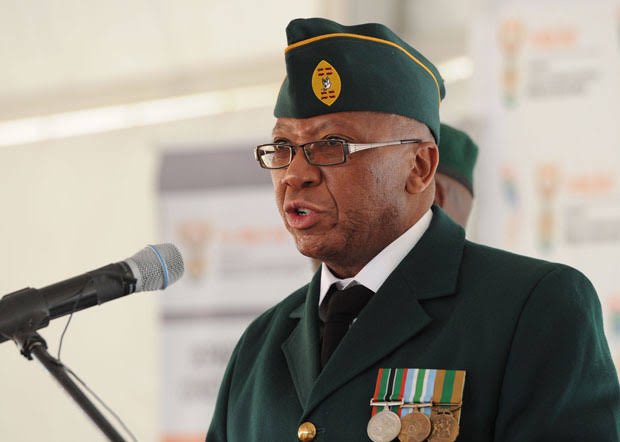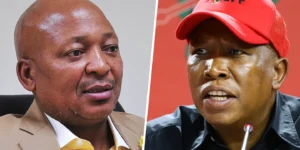Kebby Emmanuel Ramaotoane Maphatsoe (Mosia Motubatsi), known as Kebby to all his friends and comrades, was born on the 31st of December 1962.
His parents were Everista Mota and Victoria Maphatsoe. He was the seventh out of nine children.
Kebby went to primary school at Kgugamashiu, and later in 1976 he attended school in Evaton at Mokotuli School. His high school education was at Lebone High School, in Lesotho, where he finished matric (Grade 12). After having finished matric Kebby worked as a clerk at Chiawello Clinic.
Kebby’s life, like so many young people of his age, was shaped by the racist oppression of the apartheid regime. The events of the student revolt of 1976, and the subsequent heightened resistance to apartheid, deeply impacted on the political consciousness of the young Kebby Maphatsoe. As a student he became involved in the Congress of South African Students (COSAS), and was also a member of the Soweto Youth Congress.
Because of his political activism, and outspoken opposition to apartheid, he was targeted by the apartheid regime and was forced to eventually leave the country of his birth, and to go into exile.
In exile Kebby formally joined the African National Congress (ANC), and became a member of the liberation army of the ANC, Umkhonto we Sizwe (MK). He underwent training in Angola, and also received specialized training in the German Democratic Republic (GDR), the former Soviet Union and Cuba.
Throughout the time that Kebby was in exile, in the MK camps in Angola and Uganda, he was known as a highly committed soldier of MK, with a clear and unwavering political consciousness.
Kebby returned from exile in 1992. His life, and political activism, was shaped by a deep concern for his fellow MK veterans. He became the leading champion for MK veterans, and military veterans, in general. In December 2007 Kebby was elected onto the National Executive Committee (NEC) of the ANC at the 52nd National Conference at Polokwane. He used this position to advance the cause of MK veterans.
Kebby was always very clear that while MK liberation fighters had played a central, critical, role in the liberation struggle, and the subsequent achievement of democracy, they have not received the recognition that they deserved. He was deeply concerned that the integration process of MK liberation soldiers into the South African National Defense Force (SANDF) was South African Police Service (SAPS) was flawed and unfair to them. He made it his duty to address this issue, and to correct it.
In this regard Kebby was throughout an ardent supporter of instituted re-ranking processes, for what became known as the Non-statutory Forces within the SANDF and SAPS. He always ensured that MKMVA, once it was formed, gave its clear support for, and was centrally involved in, ensuring that these re-ranking processes would eventually succeed, and that justice will finally be done to MK veterans who dedicated their lives to the achievement of our liberation.
Kebby’s commitment and insistence that MK liberation soldiers must receive their full dues in the democratic dispensation that came about after the 27th of April 1994 elections, led him to play a leadership role in the formation of the Umkhonto we Sizwe Military Association (MKMVA), that was formed by MK veterans. He was always clear that MKMVA was formed by, and for, MK veterans in order to advance their own cause, and the rights that they are entitled to.
Similarly, Kebby played a central role in pushing for the establishment of the Department of Military Veterans (DMV), and also the overall representative structure for military veterans in South Africa, namely the South African National Military Veterans Association (SANMVA).
Together with MKMVA Kebby also played a central role in the drafting and eventual adaption of the Military Veterans Act, Act Number 8 of 2011, that legalized the rights that military veterans are entitled to. The adoption of this Act, and the establishment of the Department of Military Veterans (DMV), dur- ing the administration of President Jacob Zuma, represented great strides in the struggle for recognition, and full dignity, of MK military veterans, and military veterans in general.
In 2014 Kebby was appointed by President Zuma as Deputy Minister of De- fense and Military Veterans, a critical part of his responsibilities was the Department of Military Veterans. He remained Deputy Minister of Defense until 2019.
After the 2019 national elections Kebby returned as a Member of Parliament, and was a Whip with specific responsibility for the Portfolio Committee of Police.
Kebby remained throughout his life a remarkably humble, and loyal, member of the African National Congress. He was deeply committed to forging principled unity in the ANC. No matter what the challenges, he always throughout continued to implore on his fellow MK veterans to similarly remain loyal to the African National Congress. Thus Kebby accepted with discipline and dedication the Resolution of the 54th National Conference of the ANC that unity must be forged in the ranks of all MK veterans, and also convinced the rest of the MKMVA leadership to accept the Resolution, and to advance it’s implimentation.
Together with the senior leadership of MKMVA Kebby worked diligently, together with the Peace and Stability Sub-committee of the ANC NEC, to ensure that the preparations for a unity conference of MK veterans were put in place with integrity and democratic representativity. Great strides were made, and it should be possible to hold a MK unity conference this month, in September, on the basis of that excellent work, to which comrade Kebby made such a leading and definitive contribution.
Throughout his life Kebby remained fully committed to the liberation ideals and task of the ANC. Under his leadership as President of MKMVA took strong and principled positions in defense of the historical liberation task of the ANC to bring full liberation to black (especially African) South Africans.
Kebby was a true liberation soldier, who understood the meaning of comradeship. He lived this out in his jovial, warm, comradely relations with his fellow comrades. His unwavering support for President Jacob Zuma, and his pursuit for justice for him and all his fellow comrades, is legendary. In having done so he set an example for all.
Kebby was a man of faith, and a deeply religious person. As with everything that he did, his life as a leader in the St. John Apostolic Church of Prophecy was characterised by principled dedication.
Kebby is survived by his wife, Lerato, whom he married in 1995, the five children, Mary, Victoria, Lehlohonolo, Thabiso and Neo; five grandchildren, four brothers, three sisters, and his nieces and nephews.
Kebby passed on quietly in his sleep on Tuesday the 31st of August 2021, at the age of 59, at his family home in Meyersdal.
He will be sorely missed by his family, comrades and friends, for whom his remarkable life will continue to be a source of inspiration and dedication.
HAMBA KAHLE MKHONTO







